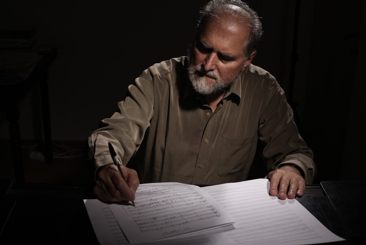
Davorin Kempf (Photo: Siniša Uštulica)
Davorin Kempf (MA music ’90) recently retired from the University of Zagreb Academy of Music where he served as a full professor in the in the Department of Composition and Theory of Music. In 2006 Kempf earned his Ph.D from Freie Universität Berlin (doctoral dissertation: Symmetrie und Variation als kompositorische Prinzipien: Interdisziplinäre Aspekte; supervisor: Professor Albrecht Riethmüller). Two years ago he became a full member of the Croatian Academy of Sciences and Arts. An award-winning composer, Kempf’s work has been performed at concerts and festivals in more than a dozen countries including the United States.
Tell us a little about your music and its connection to your time at the University of Iowa.
Generally speaking, my music is a kind of synthesis between traditional and new. I did not want to dwell in the past, and I was not prepared to accept unquestioningly all the possibilities that were being discovered by the avant-garde. I have always found composing to be spiritually inspired, and it has always been a spiritual experience. I believe that to be the very essence of art, and it is the only way in which art can communicate.
During my graduate study at the University of Iowa School of Music in Iowa City, I was interested in further research in the realm of synthesis between instrumental and electroacoustic music, between pure electronic sounds and electroacoustically transformed instrumental sounds (e. g. organ, cembalo, violoncello, orchestral sounds), between different compositional systems and techniques, etc. The main result was my MA thesis work, Spectrum for symphony orchestra and electronics. (After my return to Zagreb, it was performed a few times by the Zagreb Radio and Television Symphony Orchestra and the Zagreb Philharmonic Orchestra.) In spite of the fact that it was my first and last composition for symphony orchestra and electronics, there is no doubt that it was an extraordinary creative experience which influenced my later orchestral creation – first of all my Fresco for symphony orchestra and organ, and Chorale and Alleluia for a large wind orchestra, organ and percussion. My important electroacoustic composition Pyramids that I created in the Electronic Music Studio of the University of Iowa School of Music (I studied electroacoustic composition with Prof. DMA Kenneth Gaburo) was inspired by American minimal music. It is shaped with transpositions and electroacoustic transformations of the major triad as a readily identifiable segment of classical harmony. The programmed movement of sound through space was achieved by way of the stereo-panorama. (The premiere performance of the piece took place at the public concert of the Electronic Music Studio at the UI Music Building. I put it on the program of my double CD, published by Cantus of the Croatian Society of Composers in 2011, and on the program of the festive concert that was held at the Academy of Music of the University of Zagreb in 2017, on the occasion of my 70th birthday.) The interconnectedness between classical harmony and electroacoustic medium plays an important role in my two electroacoustic pieces realized in the Electronic Studio of Technische Universität Berlin: Fiat lux (1994) and Farbenkreis (1997). Especially in the second one which entirely rests on the echoes of different chords (mostly triads) I played on piano and recorded for processing in the Electronic Studio.
What is your favorite memory from your time at Iowa?
Contacts and talks with many interesting and nice people. First of all, with my professor of composition, Prof. Dr. Donald Martin Jenni. He was a fascinating, creative, and spiritual person – composer and musicologist, connoisseur of literature, art, history, philosophy, and religion. He was interested in different cultures and had knowledge of many languages. In his house on East Court Street, he had an impressive home library with many interesting books in different languages, and two cembalos. I remember how wonderfully he played Couperin´s music. I enjoyed his lectures at the UI School of Music and all our talks. I learned very much from his deep understanding of music, his erudition, his ideas, and opinions about various subjects. Later, in 1999, I joined the festive celebration of his retirement at the University of Iowa. With pleasure I made a broadcast about him and his wonderful music for Radio Zagreb. We had remained in communication by letters and emails until he – unfortunately, too early - passed away in 2006.
Do you have any advice for recent UI graduates entering into the early stages of their career?
Make good use of the wonderful study possibilities the University of Iowa offers to you, including its International Programs. Be both ambitious and hard working. Remember the old saying: „Quidquid agis prudenter agas et respice finem.” And never give up!
Click here to access a video recording of Adela Liculescu´s interpretation of Davorin Kempf's piano miniature Mariposa de luz (Butterfly of Light) at the 2018 Honens International Piano Competition in Berlin.